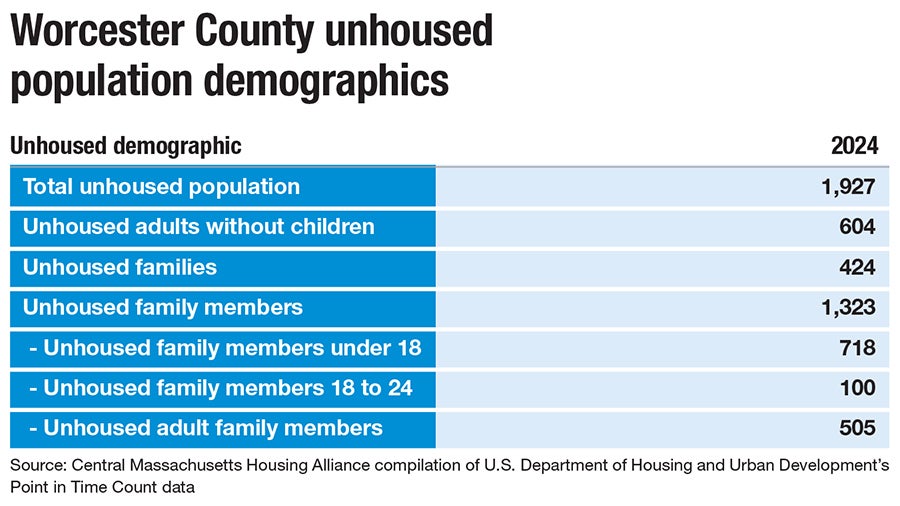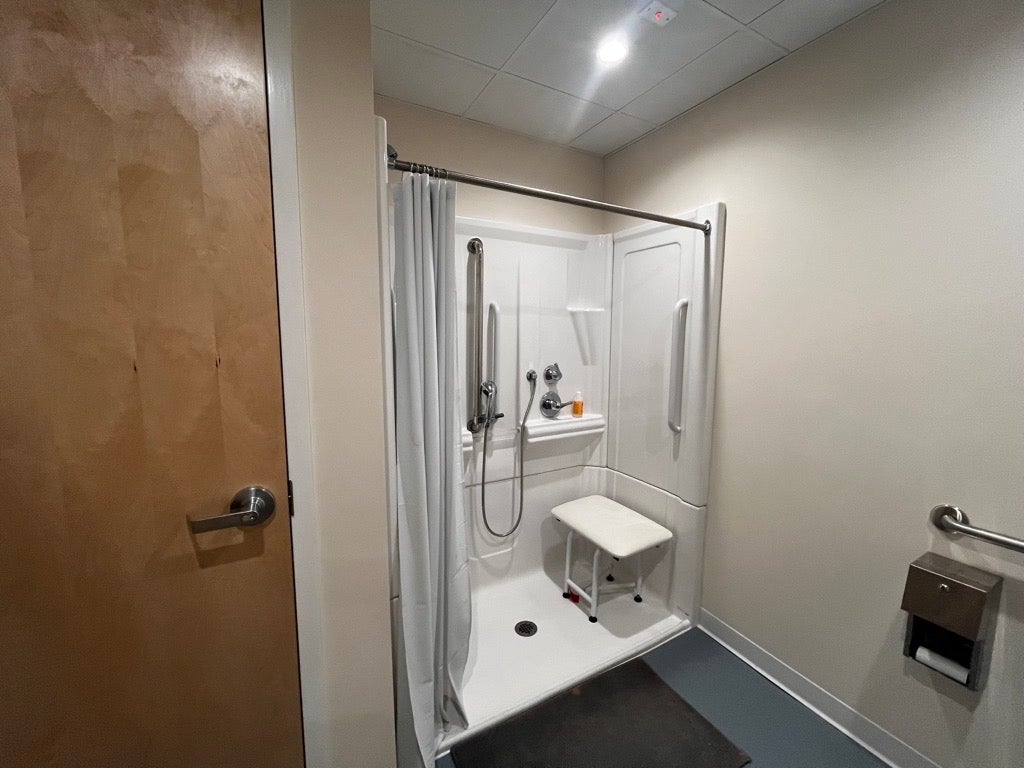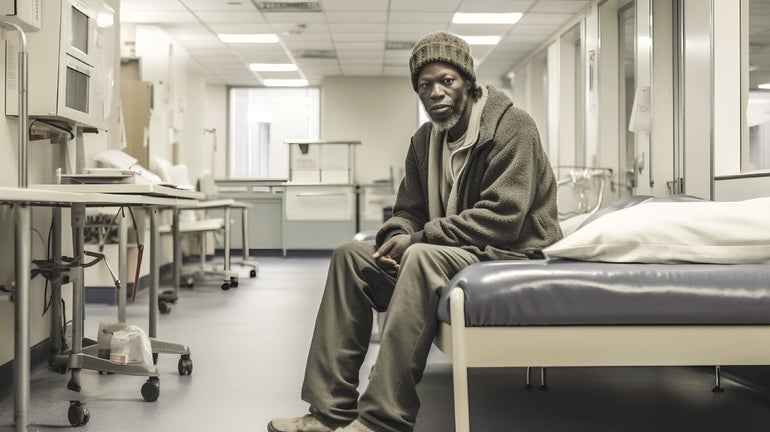UMass Memorial Medical Center in Worcester has partnered with the Framingham nonprofit South Middlesex Opportunity Council to open in February a seven-bed pilot respite program.
Get Instant Access to This Article
Subscribe to Worcester Business Journal and get immediate access to all of our subscriber-only content and much more.
- Critical Central Massachusetts business news updated daily.
- Immediate access to all subscriber-only content on our website.
- Bi-weekly print or digital editions of our award-winning publication.
- Special bonus issues like the WBJ Book of Lists.
- Exclusive ticket prize draws for our in-person events.
Click here to purchase a paywall bypass link for this article.
Transitioning out of a hospital into a home care setting comes with its own challenges, which are compounded when a patient doesn’t have anywhere to transition to.
With the goal of providing a safe and supportive space for unhoused people to recover post-acute care, reduce unnecessary hospital readmissions, and transition individuals into stable housing, UMass Memorial Medical Center in Worcester has partnered with the Framingham nonprofit South Middlesex Opportunity Council to open in February a seven-bed pilot respite program for those experiencing homelessness.
Awarded $820,000 through the Massachusetts Executive Office of Health and Human Services, the Worcester respite program is one of five pilot programs receiving a total of $5.2 million in 2023.
Minding the gap
For those unhoused, the medical respite program aims to fill the gap left in the healthcare system for individuals who no longer need hospital level care but still require support to recover.

“It's simple. I think in a lot of ways we're playing the role that well-resourced, supportive friends and family could play in other environments. But, this is very, very difficult for our patients who just don't have that structure,” said Dr. Kavita Babu, co-director of the medical respite program for UMass Memorial.
While in the program, patients work with their case managers to coordinate all aspects of their needed care including scheduling and tracking appointments, coordinating transportation to doctor’s offices and pharmacies, and utilizing state benefits.
Providers can come to the program to treat patients in the facility itself, and group therapy is offered once a week. The program is supported 24/7 by an in-house EMT who takes vitals and assists patients with medical needs.
Clients work on health literacy, understanding how the healthcare systems work, said Max Sharkey, respite care social worker for UMass Memorial. He said it’s not always readily apparent why his clients should be going to check ups and follow up appointments, which combined with the other obstacles they’re facing could lead them to choose not to go. He focuses his work heavily on the mental health and substance-use issues his patients may be dealing with. Sometimes that means connecting them with community resources, and other times it means just sitting and talking with them about what’s going on in their lives.

As one of the program’s main goals is to discharge patients to stable housing, case managers work with individuals to find where the next step once they leave the program, as per grant guidelines, patients can only stay with the program for six months.
“One hundred and eighty three days, it sounds like a long time ... but with that goal in mind, it goes remarkably quickly,” said Babu.
In fact, the low inventory of housing coupled with high demand means those looking to obtain subsidized housing can expect wait times anywhere from three to 10 years, said Leah Bradley, CEO the the Worcester nonprofit Central Massachusetts Housing Alliance.
“Whenever you have a scarcity, the most vulnerable are going to be the ones that are not going to be able to get that resource,” she said.
Barriers to access
From the obvious hurdles to the minute details, unhoused individuals face a myriad of obstacles when navigating post-acute care.
For example, in addition to transportation barriers to visit pharmacies, if individuals are able to obtain their prescriptions, they may not have access to consistent refrigeration to store them. And if they qualify for in-home care, those services quickly become moot.
“If somebody's living outdoors, and they're transient, or their encampment is no longer able to be where it was, where does the visiting nurse go?” said Bradley.
For those living on the streets, adding in the complexities and challenges of recovering from a medical stay, especially if one is navigating multiple medical issues, can become impossible, said Babu.

Patients discharged from the hospital will immediately return because they weren’t able to access the services they needed to properly heal, she said. It is medical respite programs like hers that she says interrupt that revolving door of readmission.
“When you're discharged from the hospital to a shelter environment, now you're going to be responsible for obtaining and taking your medications by yourself. No one may be paying attention to things like how much water you drink in a day, or you may not have the predictability of meals that you did in the hospital. And as each one of these tasks builds up … It's very easy for health to back slide,” said Babu.
And even when patients are discharged from the hospital with robust care plans, the barriers unhoused people face often mean they can’t always follow through with them.
“If you don't have anywhere to sleep, like if you're sleeping on the street, it's so hard to just focus on your survival,” said Sharkey. “So to then also say, ‘Well, I have to be at this doctor's appointment at 10 a.m. tomorrow and then another one at noon, and I had to take these three medications that the hospital just gave me that I'm not really familiar with,’ it's so hard. Especially because if you're out on the street, you're probably just thinking more like, ‘How am I going to stay warm or dry?” or “Where's my next meal coming from?’”

Recovering in community
Conversely, being stuck in the hospital because an unhoused person does not have a step-down facility to go to when looking to exit acute care poses several issues itself. Stuck patients are at higher risk of hospital-acquired infections that only work to worsen their conditions and the mental health effects of being confined to a hospital room take their toll.

“We have a lot of younger individuals who are in the hospital, say in their 30s, and they're kind of stuck in their room all day. That's not a great quality of life. Whereas, coming somewhere like here, it can meet their medical needs, but then [they] also have more freedom, which you know, is something most people really value especially in their 30s, 40s. It's really hard to be stuck in the hospital,” said Sharkey.
In fact, the freedom the medical respite program provides is one of its shining qualities for Sharkey. Clients typically have a curfew of 6 p.m., but they’re not confined the way they would often be in a hospital setting. Individuals are able to leave and visit with family and friends, attend complimentary programs such as partial hospitalization mental health programs, and plan their appointments around their own schedules.
That freedom means the patients are able to get to know each other and lean on each other, rather than being isolated. For Babu, the impacts of the dynamics formed between the medical respite program’s fellow clients can’t be overlooked.
“The patients are really supportive of each other, and I think that building that sense of community and peer support has been something I think that's pretty extraordinary to watch,“ she said.
Mica Kanner-Mascolo is a staff writer at Worcester Business Journal, who primarily covers the healthcare and diversity, equity, and inclusion industries.

